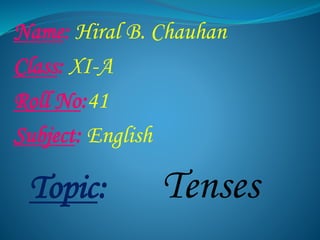
English (tenses)
- 1. Name: Hiral B. Chauhan Class: XI-A Roll No:41 Subject: English Topic: Tenses
- 2. Introduction Tense: Any form of the verb which may be used to show (i) the time of an action (ii) a state or an event can be called a Tense. In short, verb form that shows the time of action is called the tense.
- 3. There are three types of verb (A) The Present Tense (B) The Past Tense (C) The Present Tense
- 4. * Each Tense is subdivided into four heads. They are Indefinite, Continuous, Perfect and Perfect Continuous. TENSE CHART Tense Indefinite Continuous Perfect Perfect Continuous Present write, writes am writing, is writing, are writing, has written, have written has been writing, have been writing Past wrote was writing , where writing had written had been writing Future shall write, will write shall be writing, will be writing shall have written, will have written shall have been writing, will have been writing
- 5. (A) The Present Tense (1) The Simple Present Tense :- We use the simple present to describe-habitual action in the present, situation or action that will go indefinitely, things that happen always on a fixed time, general statements and permanent situations.
- 6. Form: subject + the infinitive (without to). For example: (a) I live in New York. (b) John drives a taxi. (c) I learn my lesson daily.
- 7. (2) The Present Continuous:- The present continuous tense describes - an action in progress, the continuity of an action in the present.
- 8. Form: subject + is/are/am + Present participle (1st form of the verb). For example: (a) The train is running at full speed. (b) I am revising my lesson. (c) Boys are playing cricket. (d) I am not going home today.
- 9. (3) Present Perfect Tense:- The present perfect tense refers to an action or a process that has been completed in the present.
- 10. Form: subject + has/have + Past Participle(3rd form of the verb). For Example: (a) I have posted the letter. (b)She has solved all her sums. (c) They have left for Shimla today.
- 11. (4) The Present Perfect Continuous Tense:- This Tense is used to describe an action that began in the past, is still continuing and may extend into the future.
- 12. Form: subject + has/have + been + the present participle. For Example: (a) The baby has been sleeping for 3 hours. (b) It has not been raining since morning.
- 13. (B) The Past Tense (1) The Simple Past Tense:- The past tense refers to events and actions that happened in an earlier time or in the past.
- 14. Form: subject + 2nd form of the verb. For Example: (a) He killed the snake with a stone. (b) I saw you in the market yesterday. (c) Our team won the match by two goals.
- 15. (2) Past Continuous Tense:- The past continuous tense is an important tense in English. We use it to say what we were in the middle of doing at a particular moment in the past.
- 16. Form: subject + was/were + Present Participle (1st form + ing). For example:(a) She was cooking when I telephone her. (b) I was working at 10 pm last night.
- 17. (3) The Past Perfect Tense:- The past perfect is used to express the completion of an action or event in the past.
- 18. Form: subject + had + Past Participle (3rd form of verb). For Example: (a) I had completed my work by homework. (b) The gardener had watered the plants.
- 19. (4) The Past Perfect Continuous:- This Tense is used to express an action that continued in the Past for a given period of time.
- 20. Form: subject + had been + Present Participle(1st form of the verb + ing). For Example: (a) She had been waiting for you for two hours. (b) Had you not been flying kites since noon.
- 21. (C) The Future Tense (1) The Simple Future Tense:- The future tense expresses actions or events that will happen after the present, i.e., in the future.
- 22. Form: subject + shall/will + 1st form of the verb. For Example: (a) I shall pass this year. (b) He will help you in your difficulty.
- 23. (2) The Future Continuous Tense:- The future continuous is used when we talk about an action or an event going on at a particular time or over a particular period in the future.
- 24. Form: subject + shall/will +be + Present Participle (1st form of the verb + ing). For Example: (a) I will be playing tennis at 10 am. (b) What will you be doing when I arrive.
- 25. (3) The Future Perfect Tense:- We use the future perfect to describe an activity or event that will have been completed by a certain point of time in the future.
- 26. Form: subject + shall/will + have + 3rd form of verb. For Example: (a) I shall have revised my books. (b) He will have reached home by now.
- 27. (4) The Future Perfect Continuous Tense:- We use the future perfect continuous tense to describe events or activities that have started and will continue to happen for a period or upto a point of time in the future.
- 28. Form: subject + shall/will + have been + present participle. For Example: (a) I shall not have been flying kites for long. (b) She will have been learning music for two years.